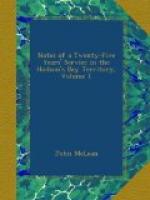I volunteered myself to go after them with an outfit; but no; it would be dividing our forces, thereby allowing an advantage to our more formidable opponents; besides, we had not much to apprehend from the Iroquois with their trifling means. “Tres bien,” I said to myself, and set off on my return forthwith. I of course lost no time in executing the orders I had received. My bourgeois had his opinion of the matter, and I had mine; I knew that the Iroquois, when left to themselves, would make their own prices for their goods, and thus, even with the small outfit they had, fleece the Indians of the principal part of their furs.
Among the Indians whom I had supplied, was an individual whose advances amounted to a heavy sum. I felt extremely anxious about him, and resolved to pay him a visit as soon as travelling was practicable; meantime, Swanston, who had been in pursuit of the Iroquois, returned from his disagreeable voyage on the 28th November, having learned nothing more than we already knew.
I set off the next day, ostensibly on a visit to Mr. S., but really with the intention of starting from his post on my intended “derouine,"[1] arrived at Fort Coulonge among the drift ice, and on the 1st December started, accompanied by the interpreter Primeau and another man, all of us with heavy burdens on our backs. This proved the most toilsome trip I had yet undertaken; the smaller lakes only were passable on the ice, and the rivers were nearly all open. The difficulties we thus encountered necessarily retarded our progress, and occupied so much more time than we had calculated upon, that our provisions were nearly consumed by the time we reached the first Indian camp, where we expected to procure a guide to conduct us to the party we were in search of. We succeeded in hiring a young man, but we only obtained a small supply of flour, the Indians having no other kind of provision to spare.
[1] “Derouine,”—a trading visit to the Indians.
Three days travelling brought us to the borders of the Indian’s lands, where we soon discovered one of his early winter encampments; had we been a few days sooner we could have easily traced him from this spot, but the snow, which had recently fallen to a great depth, had nearly obliterated the marks he had left behind him.[1] My interpreter, accustomed to “tracking,” followed the scent for two days; our guide, discontented with the short allowance, gave no assistance, till coming to an extensive “brule,"[2] he was completely at fault, as no marks of any kind could be discovered.
[1] When Indians remove in winter, in passing on rivers and lakes, they stick, at intervals, in the snow, branches of balsam, inclining in the direction they may have gone. In the woods, small saplings are cut or broken down; if there is no underwood, an occasional “blaze” serves as a sign-post to the experienced woodsman.
[2] “Brule,” a part of the forest consumed by fire.




